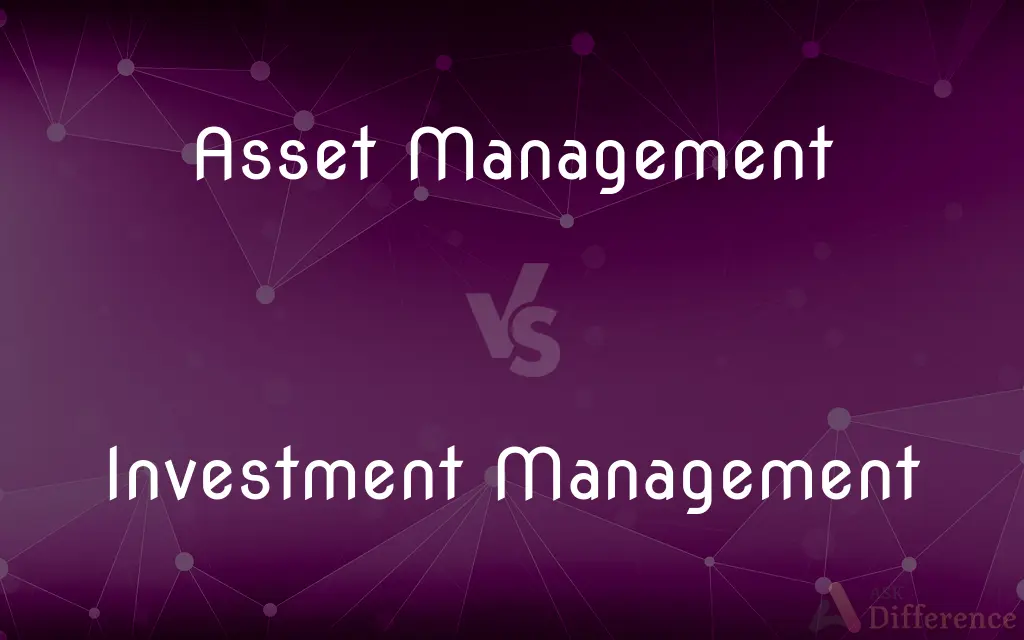Asset Management vs. Investment Management — What's the Difference?
By Tayyaba Rehman & Urooj Arif — Published on March 12, 2024
Asset management focuses on handling a broad range of investments and assets for long-term growth, while investment management is more narrowly focused on managing portfolios of securities for optimal performance.

Difference Between Asset Management and Investment Management
Table of Contents
ADVERTISEMENT
Key Differences
Asset management is a comprehensive approach to managing an individual's or institution's wealth across a broad spectrum of assets, including real estate, equities, bonds, and more. It aims at achieving long-term financial goals by diversifying investments and considering the client's overall financial situation. On the other hand, investment management, a subset of asset management, specifically deals with managing a portfolio of securities, such as stocks and bonds, to maximize returns according to the investor's risk tolerance and investment objectives.
The scope of services in asset management often extends beyond just picking investments; it can include estate planning, tax advice, and retirement planning. This holistic approach ensures that all financial aspects of the client's life are considered in the management strategy. Investment management, while it may consider the client's broader financial goals, primarily focuses on the investments themselves, strategizing on asset allocation, stock selection, and monitoring financial markets to optimize portfolio performance.
Asset managers may have a broader mandate, allowing them to invest in a wide range of assets beyond traditional stocks and bonds, such as real estate, commodities, and private equity. This diversification can help mitigate risks and capitalize on opportunities across different investment sectors. Investment managers, however, typically operate within the confines of the stock, bond, and other securities markets, employing strategies to outperform certain benchmarks or indices.
In terms of client interaction, asset management often involves a more holistic relationship with the client, taking into account their entire financial picture to provide tailored advice and solutions. Investment management's interaction may be more focused on the investment strategy and performance of the portfolio, with discussions centered around market trends, portfolio adjustments, and financial targets.
While both asset and investment management aim to grow the client's wealth, the approach and breadth of services differ significantly. Asset management's broad focus on a wide array of assets and financial planning services offers a comprehensive wealth management solution, whereas investment management's concentrated effort on securities portfolio management seeks to achieve the best possible investment performance.
ADVERTISEMENT
Comparison Chart
Scope
Broad, covering all types of assets
Narrow, focused on securities like stocks and bonds
Services
Includes estate planning, tax advice, and more
Primarily focused on portfolio management
Goal
Long-term growth across diverse assets
Maximizing returns from securities
Investment Types
Real estate, equities, bonds, private equity, etc.
Stocks, bonds, and other securities
Risk Management
Diversification across various asset classes
Asset allocation and stock selection within markets
Client Relationship
Holistic, considering the client's overall financial situation
Focused on investment strategy and portfolio performance
Strategy
Diversification and long-term planning
Optimizing portfolio performance against benchmarks
Compare with Definitions
Asset Management
Asset management includes a variety of asset classes.
Their asset management strategy included both traditional stocks and alternative investments.
Investment Management
Investment management concentrates on securities to optimize returns.
The investment manager adjusted the stock portfolio to respond to market volatility.
Asset Management
Asset managers provide comprehensive financial planning.
The asset manager advised on estate planning to protect their wealth for future generations.
Investment Management
Investment management strategies are tailored to client risk tolerance.
The investment manager developed a conservative strategy for the risk-averse client.
Asset Management
Asset management focuses on long-term asset growth.
Through asset management, they diversified their portfolio to ensure long-term stability.
Investment Management
Investment management focuses on market-based assets.
Investment management utilized a mix of bonds and stocks to balance the portfolio.
Asset Management
Asset management encompasses managing a wide array of investments for wealth growth.
Their asset management plan included investments in real estate and emerging technologies.
Investment Management
Investment managers aim to outperform market benchmarks.
Their investment management strategy focused on beating the S&P 500 index.
Asset Management
Asset management aims to meet overall financial goals.
Asset management helped them align their investment strategy with their retirement goals.
Investment Management
Investment management involves active portfolio adjustments.
Frequent portfolio reviews and adjustments were key aspects of their investment management.
Common Curiosities
Do asset managers provide investment advice?
Yes, asset managers provide investment advice as part of a holistic approach to wealth management, which may include advice on a wide range of asset types.
Can investment management be considered a part of asset management?
Yes, investment management is a subset of asset management, focusing specifically on securities within the broader array of assets that asset management covers.
Can asset management help with retirement planning?
Yes, asset management can play a key role in retirement planning by aligning investment strategies with long-term retirement goals and financial needs.
How do investment managers optimize portfolio performance?
Investment managers optimize portfolio performance through strategic asset allocation, stock selection, and continuous monitoring of financial markets to make timely adjustments.
What is the primary difference between asset management and investment management?
Asset management has a broader scope, managing a wide range of assets and offering comprehensive financial services, while investment management specifically focuses on optimizing securities portfolios.
How often do asset and investment managers review client portfolios?
The frequency of portfolio reviews can vary but typically includes regular assessments to ensure alignment with goals and adjustments in response to market changes or life events.
What types of clients use asset management services?
Both individual and institutional investors, such as pension funds and corporations, use asset management services to grow their wealth and achieve financial goals.
What is a benchmark in investment management?
A benchmark in investment management is a standard or index against which the performance of a portfolio can be measured, such as the S&P 500 for U.S. equities.
Why might an investor choose asset management over investment management?
An investor might choose asset management for a comprehensive approach to wealth growth, including financial planning services beyond just investment portfolio management.
What role does risk management play in asset and investment management?
In asset management, risk management involves diversifying across different asset classes to mitigate risk, while in investment management, it focuses on aligning investments with the client's risk tolerance and market conditions.
Share Your Discovery

Previous Comparison
Neurons vs. Neuroglia
Next Comparison
Conduct Disorder vs. Oppositional Defiant DisorderAuthor Spotlight
Written by
Tayyaba RehmanTayyaba Rehman is a distinguished writer, currently serving as a primary contributor to askdifference.com. As a researcher in semantics and etymology, Tayyaba's passion for the complexity of languages and their distinctions has found a perfect home on the platform. Tayyaba delves into the intricacies of language, distinguishing between commonly confused words and phrases, thereby providing clarity for readers worldwide.
Co-written by
Urooj ArifUrooj is a skilled content writer at Ask Difference, known for her exceptional ability to simplify complex topics into engaging and informative content. With a passion for research and a flair for clear, concise writing, she consistently delivers articles that resonate with our diverse audience.














































